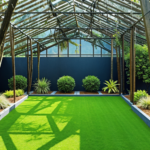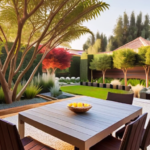Are you considering adding a few white flowering bushes to your garden but are unsure where to start? Well, do not worry.
We have got you covered. And even better is that there are many options. Shrubs with white flowers are versatile plants that can grow in many soil types and nearly every USDA hardiness zone. Also, they are excellent choices for lining the walkway or driveway path into your home or just the exterior of your garden space.
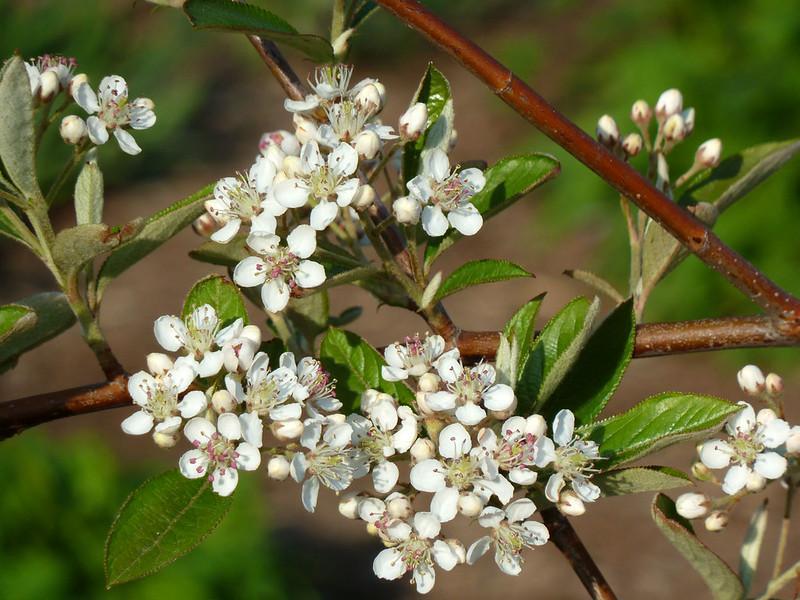
White flowers look clean and pure. Also, they add an element to your garden and brighten it up.
Finding a perfect white flowering shrub for your garden essentially comes down to the look you are going for and where you live.
For example, a few shrubs with white flowers, such as hibiscus, viburnum, and camellia, need a warmer climate to thrive. In comparison, some other white flowering shrubs like elderberry and chokeberry thrive in relatively colder weather. But no matter where you are and which shrub you use, the contrast of white flowers next to green leaves is refreshing.
So, let’s get started and help you pick the best fit for your landscape.
Beautiful Bushes With White Flowers
Shrubs with white flowers carry a sense of purity and are great for brightening dark areas of the landscape. Some are even known for their fragrant blooms and ability to draw in wildlife such as bees, butterflies, and hummingbirds. In contrast, other white flowering bushes are ideal for foundation plantings, containers, and garden or lawn borders.
Likewise, some shrubs and bushes with white flowers are small and have subtle white blooms. In comparison, others are large and are often employed as specimen plants, hedges, and living screens. So, let’s take a look at some of them.
1. Virginia Sweetspire (Itea virginica)
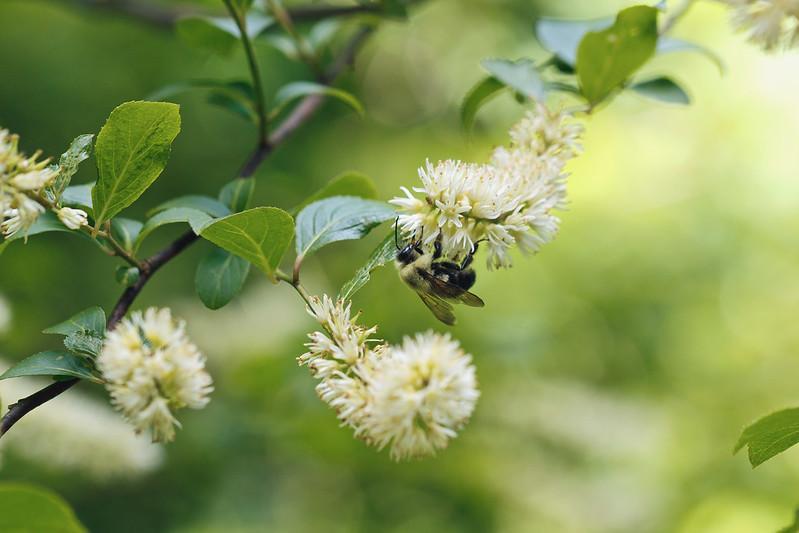
Virginia Sweetspire is a low-maintenance white blooming shrub recommended for medium-acid soils.
Overview
Virginia Sweetspire has a rounded growth habit, producing drooping white blooms from late spring to mid-summer. Other than white flowers, it has elegant arching red to purple-stemmed branches and long-lasting fall colors that last well into winter. And if all that isn’t enough, Virginia Sweetspire is easy to grow in any standard, well-drained soil.
Quick Facts & Care Guide
| Gardening Aspect | Details |
| Plant Type | Deciduous shrub |
| USDA Hardiness Zones | 5 to 9 |
| Origin | North America |
| Mature Height | 3 to 5 feet (0.91 to 1.52 meters) |
| Mature Spread | 3 to 5 feet (0.91 to 1.52 meters) |
| Blooming Season | Spring to Summer |
| Flower Characteristics | Fragrant white flowers, cylindrical shape, 1 to 2 inches |
| Foliage Characteristics | Ovate-shaped dark green leaves, 2 to 4 inches long |
| Sunlight Requirements | Full sun to part shade |
| Soil Requirements | Moist, well-drained soil |
| Watering Requirements | Regular watering. Keep the soil consistently moist |
| Fertilizer Requirements | Apply a balanced fertilizer in early spring |
Where To Buy?
Virginia Sweetspire – Itea virginica ‘Henry’s Garnet’ (3 Gal.)
2. Viburnum (Viburnum spp.)
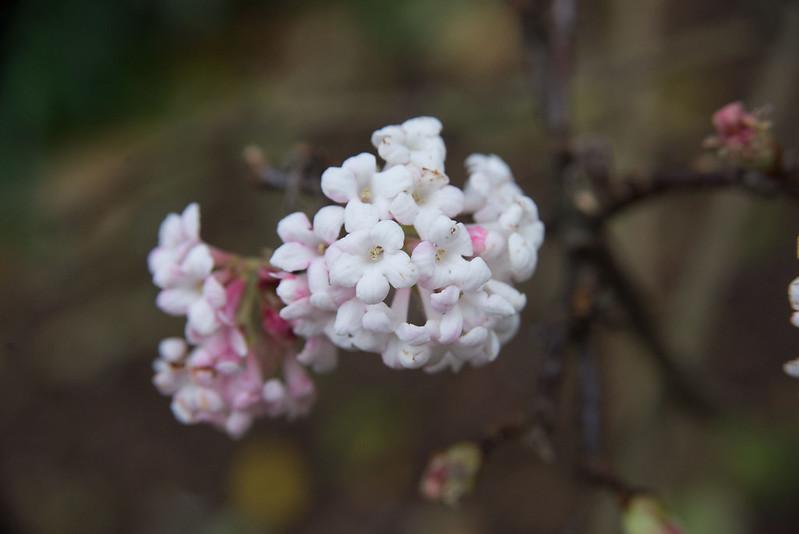
The Viburnum genus contains more than 150 different ornamental woody shrub species.
Overview
Viburnum bushes are prized for their flowers, fragrance, and fruits. And these elegant shrubs provide interest across the seasons. They come in many forms and sizes, so one is bound to fit your garden. Also, they have long been among the most popular landscape shrubs. Many have either white or pink blooms in early spring. With all of that going for them, it’s not hard to see why they are among the best-loved white flowering garden shrubs ever.
Quick Facts & Care Guide
| Gardening Aspect | Details |
| Plant Type | Depending on species, evergreen or deciduous shrub |
| USDA Hardiness Zones | 3 to 9 |
| Origin | North America, Asia, Europe |
| Mature Height | 2 to 20 ft (0.6 to 6.1 m) |
| Mature Spread | 2 to 20 ft (0.6 to 6.1 m) |
| Blooming Season | Spring, Summer |
| Flower Characteristics | Fragrant white or pink flowers |
| Foliage Characteristics | Opposite, simple, deciduous, or evergreen leaves |
| Sunlight Requirements | Full sun to part shade |
| Soil Requirements | Well-drained, loamy soil |
| Watering Requirements | Moderate watering needs |
| Fertilizer Requirements | Balanced, slow-release fertilizer in spring |
Where To Buy?
Seeds of Viburnum Opulus, Viburnum Obier – Etsy
3. Seven-Son Flower (Heptacodium miconioides)
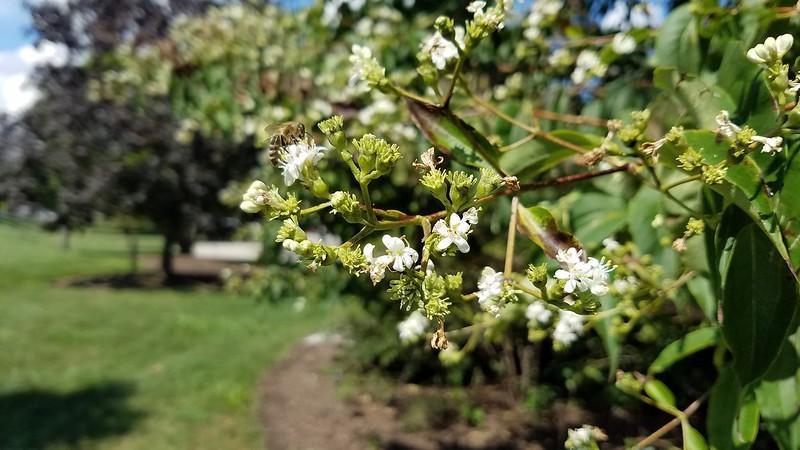
The seven-son flower earned its interesting name for its clusters of seven buds.
Overview
A beautiful, easy-to-grow small shrub that can’t be matched for its year-round beauty. It was known only by collectors and plant geeks a few years ago. However, it has become widespread in the recent few years. Aside from its magnificent white blooms, its whitish-tan bark peels in strips and strikes against a dark background when mature.
Quick Facts & Care Guide
| Gardening Aspect | Details |
| Plant Type | Deciduous shrubs or small tree |
| USDA Hardiness Zones | 5 to 9 |
| Origin | China |
| Mature Height | 5 to 7 m (15 to 25 ft) |
| Mature Spread | 3 to 4 m (10 to 15 ft) |
| Blooming Season | Late Summer, Early Fall |
| Flower Characteristics | Clusters of fragrant white flowers |
| Foliage Characteristics | Opposite, dark green leaves that turn purplish-red in autumn |
| Sunlight Requirements | Full sun to part shade |
| Soil Requirements | Moist, well-drained soil |
| Watering Requirements | Regular watering |
| Fertilizer Requirements | Balanced fertilizer in spring and summer |
Where To Buy?
Temple of Bloom® Seven-Son Flower
4. Tea Olive (Osmanthus fragrans)
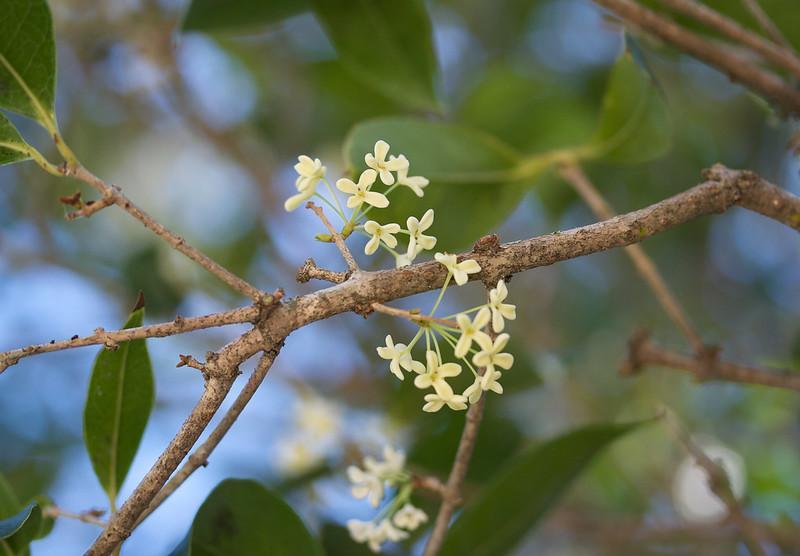
The sweet scent of tree olives makes them ideal for planting near outdoor living areas and windows.
Overview
Also known as sweet olive, tree olive is an evergreen shrub. They have long been grown as indoor plants, but recently, they have become increasingly popular as outdoor shrubs for bordering walkways and driveways. Their most attractive feature is their intensely fragrant white blooms, which emerge throughout the year if conditions are right. Also, it is a versatile plant that acts as a beautiful backdrop for gardening landscapes.
Quick Facts & Care Guide
| Plant Type | Semi-evergreen shrub |
| USDA Hardiness Zones | 7 to 10 |
| Origin | China, Japan |
| Mature Height | 3 to 12 m (10 to 40 ft) |
| Mature Spread | 3 to 6 m (10 to 20 ft) |
| Blooming Season | Fall, Winter |
| Flower Characteristics | Clusters of small, highly fragrant white or yellow flowers |
| Foliage Characteristics | Opposite, leathery, evergreen leaves |
| Sunlight Requirements | Full sun to part shade |
| Soil Requirements | Well-drained, loamy soil |
| Watering Requirements | Regular watering |
| Fertilizer Requirements | Balanced fertilizer in spring and summer |
Where To Buy?
5 Osmanthus fragrans (Tea Olive) Seeds T1024 – Etsy
5. Summersweet (Clethra alnifolia)
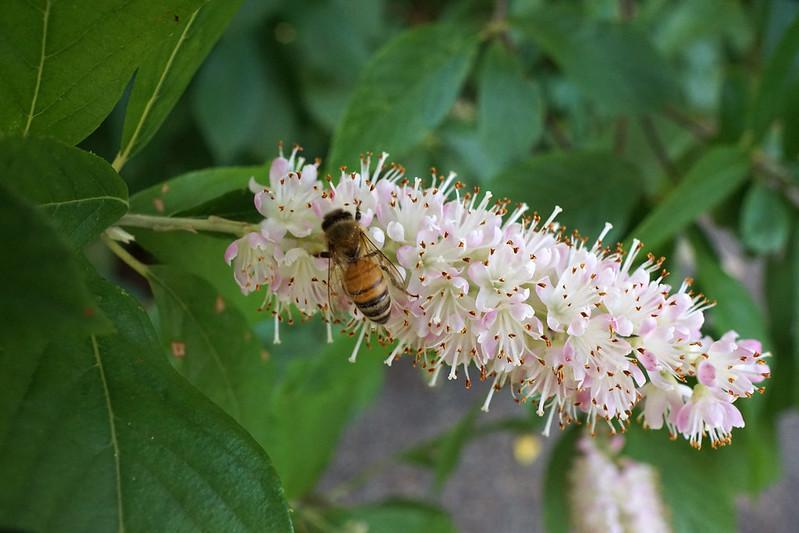
Summersweet truly lives up to its name, producing abundantly sweetly scented flowers in summer.
Overview
The white flowers of summersweet are known for their ability to bloom even in the shade, how late they bloom the season, and their size, which makes them hard to miss even from afar. It is often in the landscape borders near foundations or a specimen in group plantings. You can plant them near an outdoor living space or a patio to enjoy the fragrant white summer flowers. It is deer-resistant and helps attract pollinators to gardens.
Quick Facts & Care Guide
| Plant Type | Deciduous shrub |
| USDA Hardiness Zones | 3 to 9 |
| Origin | Eastern North America |
| Mature Height | 1.2 to 3 m (4 to 10 ft) |
| Mature Spread | 1.2 to 3 m (4 to 10 ft) |
| Blooming Season | Mid to Late Summer |
| Flower Characteristics | Fragrant, spiky white or pink flowers |
| Foliage Characteristics | Alternate, dark green, deciduous leaves turning yellow in fall |
| Sunlight Requirements | Full sun to part shade |
| Soil Requirements | Moist, well-drained soil |
| Watering Requirements | Regular watering |
| Fertilizer Requirements | Fertilize in spring with a balanced fertilizer |
Where To Buy?
20 Pink SUMMERSWEET BUSH Clethra Alnifolia – Etsy
6. Snowflake Euphorbia (Euphorbia leucocephala)
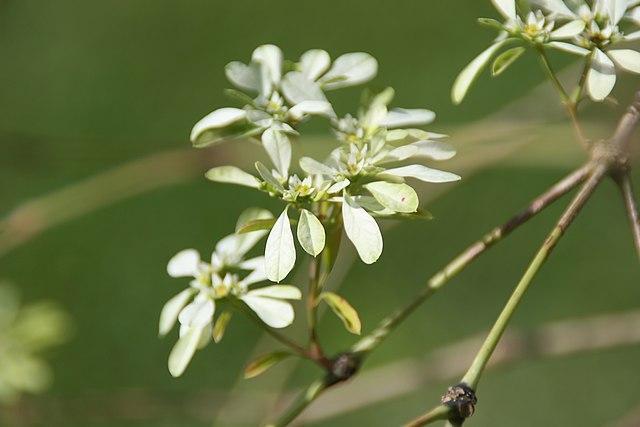
Snowflake Euphorbia radiates an irresistible fragrance that lingers in the air.
Overview
Snowflake Euphorbia is a fascinating plant from Central America. It displays a mesmerizing show of white, creamy, small flowers during autumn and winter. These small bushes suit well to tropical gardens.
However, you can also display them in mid to rear positions in flower beds or mixed borders, providing contrast and a fantastic backdrop to the greenery. Also, they are hardy, go with many soil types, and can survive heat and drought.
Quick Facts & Care Guide
| Plant Type | Clethra alnifolia |
| USDA Hardiness Zones | 8 to 11 |
| Origin | Mexico |
| Mature Height | 1.2 to 1.5 m (4 to 5 ft) |
| Mature Spread | 1.2 to 1.5 m (4 to 5 ft) |
| Blooming Season | Late Summer, Fall |
| Flower Characteristics | Clusters of small white flowers with showy, petal-like bracts |
| Foliage Characteristics | Evergreen, blue-green leaves |
| Sunlight Requirements | Full sun to part shade |
| Soil Requirements | Well-drained soil |
| Watering Requirements | Drought-tolerant once established |
| Fertilizer Requirements | Does not require regular fertilization |
Where To Buy?
Euphorbia Leucocephala, Snowflake Bush – Plant
7. Spiraea (Spiraea spp.)
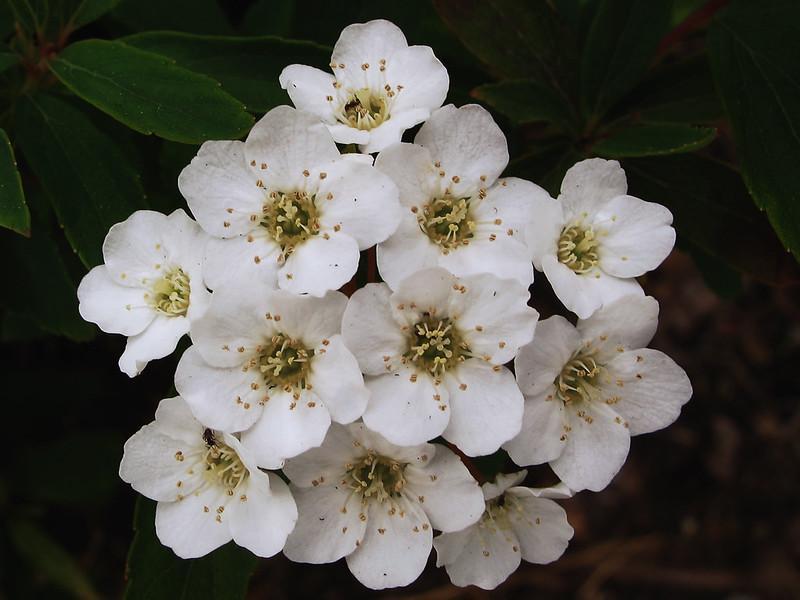
Spiraea bushes have long-lasting blooms, and they make lovely flowering shrubs.
Overview
Spiraeas are easy-to-grow white flowering shrubs and excellent choices for a garden border. However, they are not a good choice for pots. Aside from their lovely white blooms, these deciduous shrubs have vibrant foliage, delivering seasonal appeal even when not in bloom. It is essential to mention that Spiraea is a genus of over 80 woody shrubs, so before you buy these bushes, ensure you have the correct species.
Quick Facts & Care Guide
| Plant Type | Deciduous shrub |
| USDA Hardiness Zones | Varies by species, typically 3-8 |
| Origin | Northern Hemisphere |
| Mature Height | Varies by species, typically 1 to 3 m (3 to 10 ft) |
| Mature Spread | Varies by species, typically 1 to 3 m (3 to 10 ft) |
| Blooming Season | Spring to summer, depending on the species |
| Flower Characteristics | Clusters of tiny flowers in shades of white, pink, or red |
| Foliage Characteristics | Depending on species, simple or compound leaves |
| Sunlight Requirements | Full sun to part shade |
| Soil Requirements | Well-drained soil. But tolerates a wide range of soil types |
| Watering Requirements | Regular watering during the growing season |
| Fertilizer Requirements | Fertilize in spring with a balanced fertilizer |
Where To Buy?
50 White CHINESE SPIREA Flower Bush Shrub Seeds
8. Serviceberry (Amelanchier spp.)
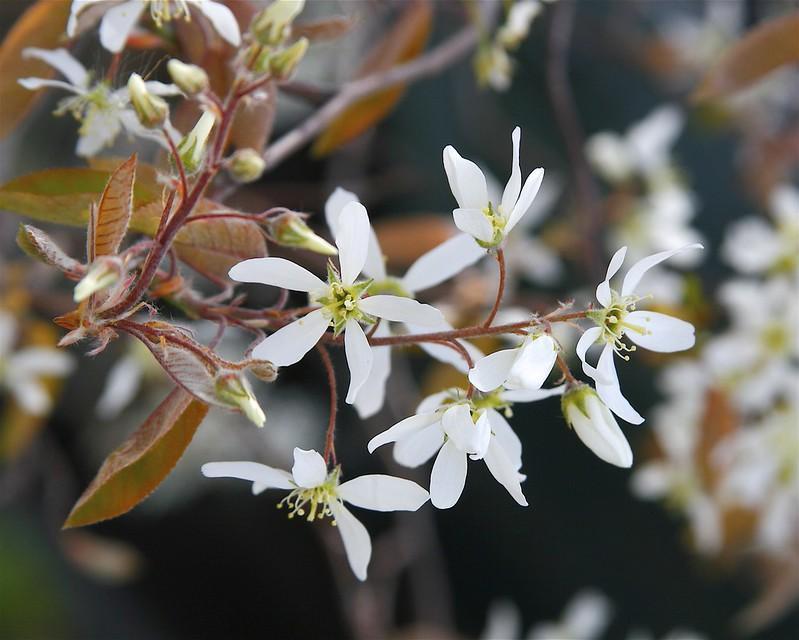
Serviceberries are bushes or trees with a beautiful white flower shape and edible fruit.
Overview
Serviceberry bushes have gray bark and green leaves, frequently used in gardening landscapes as border plants. Their name refers to their white flowers, often used in funeral services. These bushes are also called juneberry shadblow, shadbush, and saskatoon, and several species of these plants are planted in parts of the United States. So, when growing, ensure you have the suitable species for your region and climate.
Quick Facts & Care Guide
| Plant Type | Deciduous shrubs or small tree |
| USDA Hardiness Zones | Varies by species, typically 3 to 9 |
| Origin | Northern Hemisphere |
| Mature Height | Varies by species, typically 3 to 8 m (10 to 25 ft) |
| Mature Spread | Varies by species, typically 2 to 6 m (6 to 20 ft) |
| Blooming Season | Spring, early to mid-season, depending on the species |
| Flower Characteristics | Clusters of white, pink, or red flowers |
| Foliage Characteristics | Deciduous, serrated leaves turning yellow, orange, or red in fall |
| Sunlight Requirements | Full sun to part shade |
| Soil Requirements | Well-drained, acidic soil |
| Watering Requirements | Regular watering during the growing season |
| Fertilizer Requirements | Fertilize in spring with a balanced fertilizer |
Where To Buy?
15 Amelanchier laevis, Serviceberry Seeds – Etsy
9. Rose of Sharon (Hibiscus syriacus)
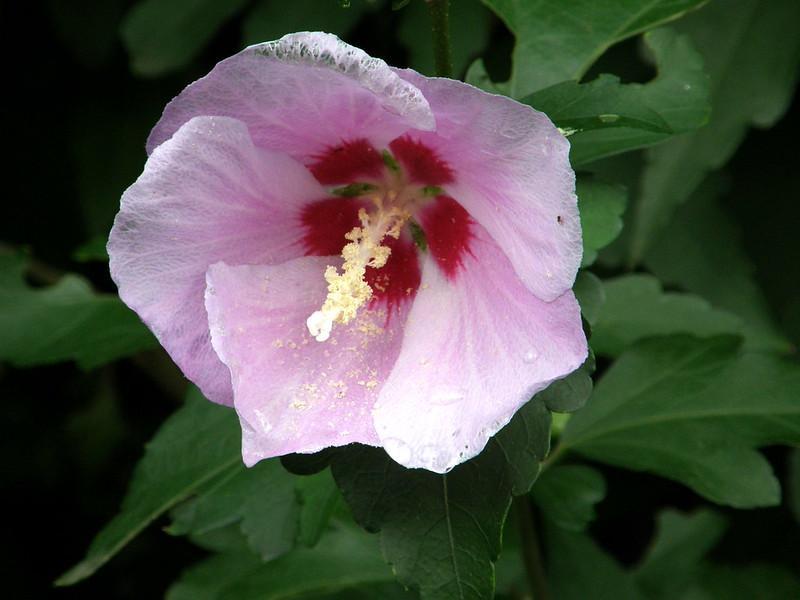
Growing the rose of Sharon is an easy way to add long-lasting summer color to your backyard.
Overview
If you live in a frigid part of the country where nothing grows outdoors in the gardens, rose of Sharon is for you. These plants are cold-hardy and can overwinter outdoors in temperatures as low as 20° degrees Centigrade below zero. However, do not let its name fool you. Despite being called, the rose of Sharon, it is not a rose at all. However, it is the national flower of South Korea, making appearances on its banknotes and several national emblems.
Quick Facts & Care Guide
| Plant Type | Deciduous shrub |
| USDA Hardiness Zones | 5 to 9 |
| Origin | China, India, Korea, and Syria |
| Mature Height | 2 to 4 m (6 to 12 ft) |
| Mature Spread | 2 to 3 m (6 to 10 ft) |
| Blooming Season | Summer to early fall |
| Flower Characteristics | Large, showy, hibiscus-like flowers in shades of white, pink, red, or purple |
| Foliage Characteristics | Deciduous, glossy green leaves |
| Sunlight Requirements | Full sun to part shade |
| Soil Requirements | Well-drained soil. But tolerates a wide range of soil types |
| Watering Requirements | Regular watering during the growing season |
| Fertilizer Requirements | Fertilize in spring with a balanced fertilizer |
Where To Buy?
25 White & Hot Pink ROSE Of SHARON Seeds
10. Potentilla (Potentilla fruticosa)
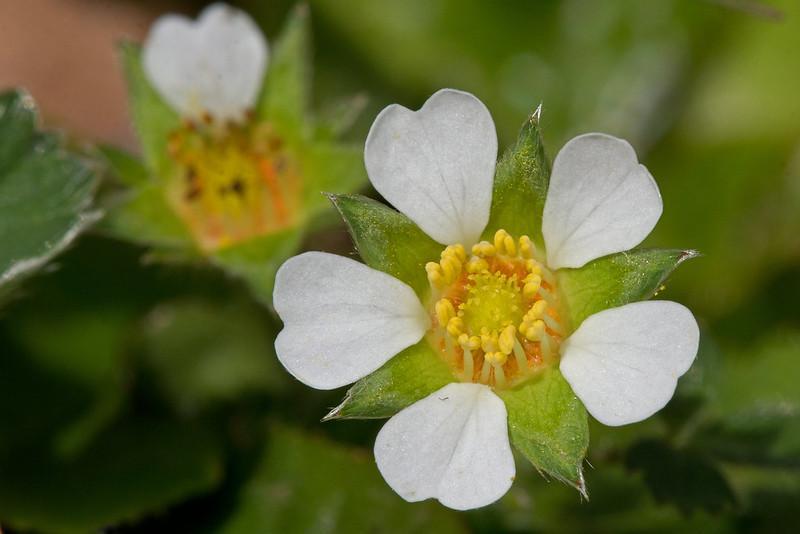
The shrub is super tiny. But what it lacks in size, it makes up in ornamental impact.
Overview
Potentilla is valued for its carefree nature, hardiness, and long bloom time. It is also called bush cinquefoil and shrubby cinquefoil and is one of the most popular landscape shrubs in the United States. Their whistle flowers look fabulous along slopes, as hedging plants, and in flower beds, borders, and rock gardens. Some potentillas also have small berries which resemble strawberries, but the fruit is small and inedible.
Quick Facts & Care Guide
| Plant Type | Deciduous shrub |
| USDA Hardiness Zones | 2 to 7 |
| Origin | Northern Hemisphere |
| Mature Height | 0.6 to 1 m (2 to 3 ft) |
| Mature Spread | 0.6 to 1.2 m (2 to 4 ft) |
| Blooming Season | Late spring to early fall |
| Flower Characteristics | Small, five-petaled flowers in shades of yellow, white, pink, or red |
| Foliage Characteristics | Deciduous, palmate leaves with 5-7 leaflets |
| Sunlight Requirements | Full sun to part shade |
| Soil Requirements | Well-drained soil. However, tolerates a wide range of soil types |
| Watering Requirements | Regular watering during the growing season |
| Fertilizer Requirements | Fertilize in spring with a balanced fertilizer |
Where To Buy?
Potentilla arguta White Pale Yellow Flower Seeds – Etsy
11. Pearlbush (Exochorda x macrantha)
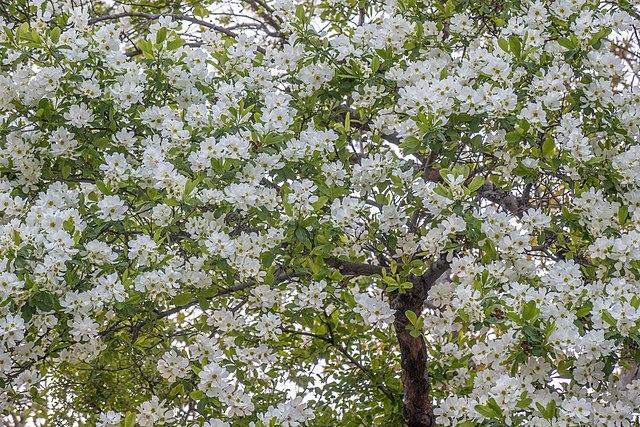
Pearlbush is one of the most spectacular flower shrubs with abundant white spring blooms.
Overview
Commonly known as ‘The Bride,’ pearl bush is an immensely favored deciduous shrub with good reason. It produces abundant, showy, saucer or cup-shaped white flowers and is often used s an isolated specimen plant or border shrub for walkways and lawns. Furthermore, these plants are hardy and easy to grow, making them ideal candidates for homeowners who want a stunning display of white flowers but don’t have much time.
Quick Facts & Care Guide
| Plant Type | Deciduous shrub |
| USDA Hardiness Zones | 4 to 8 |
| Origin | Hybrid of two Chinese species (Exochorda racemosa and E. korolkowii) |
| Mature Height | 1.5 to 3 m (5 to 10 ft) |
| Mature Spread | 1.5 to 3 m (5 to 10 ft) |
| Blooming Season | Late spring to early summer |
| Flower Characteristics | Profuse clusters of white or pinkish-white, pearlescent flowers |
| Foliage Characteristics | Deciduous, dark green leaves turning yellow in fall |
| Sunlight Requirements | Full sun to part shade |
| Soil Requirements | Well-drained soil |
| Watering Requirements | Regular watering during the growing season |
| Fertilizer Requirements | Fertilize in spring with a balanced fertilizer |
Where To Buy?
Pearl Bush, Lotus Moon – Exochorda X macrantha ‘Bailmoon.’
12. Orange Jasmine (Murraya paniculata)
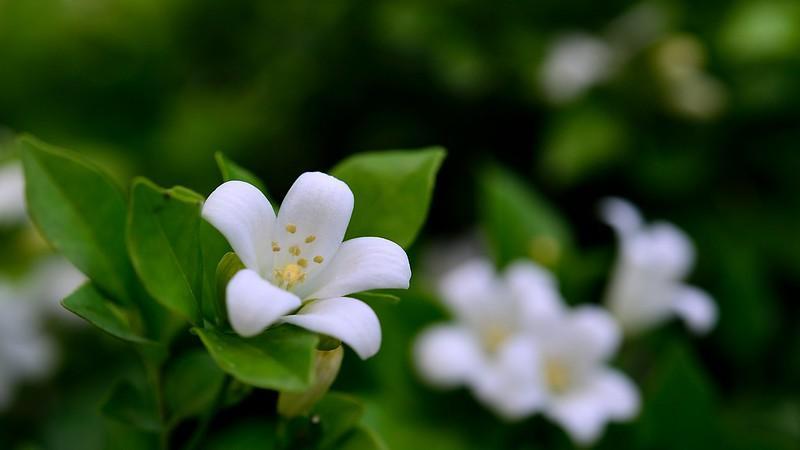
If you want a white flowering shrub to bring pollinators to your garden, orange jasmine is for you.
Overview
Filling the air of your outdoor space with the sweet smell of white blossoms, orange jasmine is a fantastic addition to any yard and garden if you want to attract bees, butterflies, and birds. Their sweet scent will waft through your house quite nicely, and they make excellent plants for hedges and natural privacy screens. Furthermore, the Orange Jasmine shrub is easy to care for, and it is well-loved by gardeners and hobbyists from across the globe.
Quick Facts & Care Guide
| Plant Type | Evergreen shrubs or small tree |
| USDA Hardiness Zones | 9-11 |
| Origin | Southeast Asia |
| Mature Height | 3-6 m (10-20 ft) |
| Mature Spread | 1.5-3 m (5-10 ft) |
| Blooming Season | Spring to summer |
| Flower Characteristics | Fragrant, small, white flowers in clusters |
| Foliage Characteristics | Glossy, dark green, evergreen leaves |
| Sunlight Requirements | Full sun to part shade |
| Soil Requirements | Well-drained soil |
| Watering Requirements | Regular watering during the growing season |
| Fertilizer Requirements | Fertilize in spring and summer with a balanced fertilizer |
Where To Buy?
Orange jasmine – Murraya paniculata – 10 fresh seeds
13. Oleander (Nerium oleander)
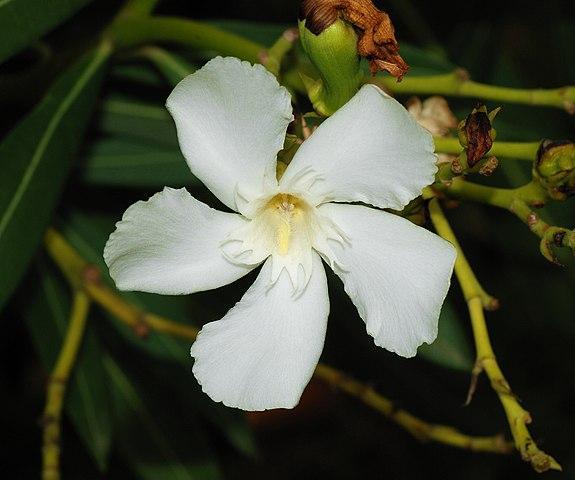
Oleanders are unique, lovely, large, flowering shrubs that thrive with little care.
Overview
Olendars are hardy plants. They tolerate various stressful gardening conditions such as drought, reflected heat from walls and pavements, severe pruning, high soil pH, salt spray, and difficult soil conditions.
Furthermore, the evergreen foliage of the oleander plants is dark green, leathery, and dense, which makes an excellent natural privacy screen when these bushes are planted in groups alongside garden or backyard borders and corners.
Quick Facts & Care Guide
| Plant Type | Evergreen or deciduous shrubs or small tree |
| USDA Hardiness Zones | 8-11 |
| Origin | Mediterranean |
| Mature Height | 3-6 m (10-20 ft) |
| Mature Spread | 1.5-3 m (5-10 ft) |
| Blooming Season | Summer to fall |
| Flower Characteristics | Fragrant, showy, funnel-shaped flowers in shades of pink, white, yellow, or red |
| Foliage Characteristics | Glossy, dark green, evergreen leaves |
| Sunlight Requirements | Full sun to part shade |
| Soil Requirements | Well-drained soil |
| Watering Requirements | Drought-tolerant once established, regular watering during the growing season |
| Fertilizer Requirements | Fertilize in spring and summer with a balanced fertilizer |
Where To Buy?
20 Oleander Seeds-White Flowers, Ideal Hedge – Etsy
14. Ninebark (Physocarpus opulifolius)
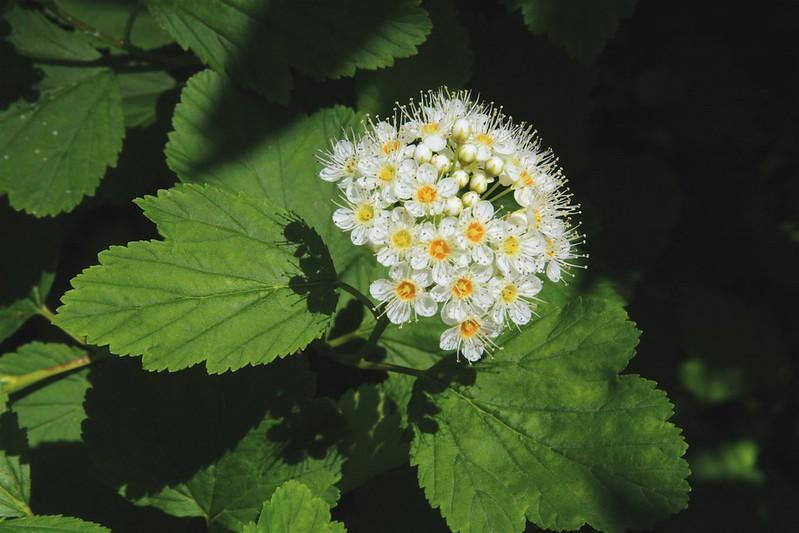
Typically known for its attractive, exfoliating bark, growing nine-bark shrubs is easy.
Overview
Only a handful of ornamental white flowering shrubs can match ninebark for its four-season interest, easy maintenance, and exceptional toughness. It is a member of the rose family and gets its name from its distinctive foliating bark, which peels back in thin layers as its plant matures.
Ninebark attracts birds and beautiful-looking butterflies, and in the garden, it can be planted as a specimen plant or in groups as a border shrub.
Quick Facts & Care Guide
| Plant Type | Deciduous shrub |
| USDA Hardiness Zones | 2-8 |
| Origin | North America |
| Mature Height | 2-4 m (6-12 ft) |
| Mature Spread | 1.5-3 m (5-10 ft) |
| Blooming Season | Late spring to early summer |
| Flower Characteristics | Clusters of small, white to pink flowers |
| Foliage Characteristics | Opposite, dark green leaves that turn shades of red, orange, or purple in fall |
| Sunlight Requirements | Full sun to part shade |
| Soil Requirements | Well-drained soil |
| Watering Requirements | Drought-tolerant once established |
| Fertilizer Requirements | Fertilize in spring with a balanced fertilizer |
Where To Buy?
Ninebark 100pcs+ gift seeds/ Eastern ninebark – Etsy
15. New Jersey Tea (Ceanothus americanus)
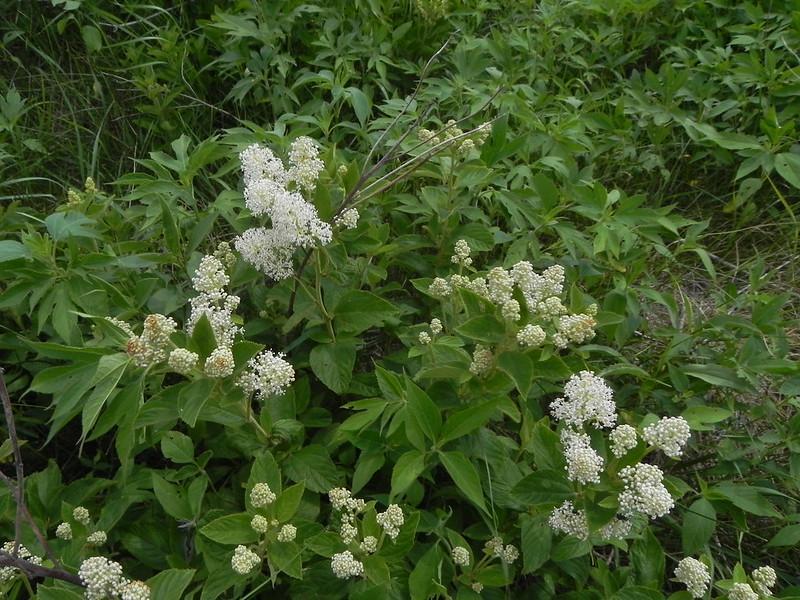
New Jersey Tea is an excellent choice as a good border for wildflower gardens or naturalized areas.
Overview
Also known as mountain snowbell, New Jersey Tea boasts long, woody stems with toothed, dark green leaves and tiny, fragrant white flowers. It’s a stout shrub with leaves used to make tea a few hundred years ago. Furthermore, while its flowers are impressive, it is also a nectar source that attracts beautiful butterflies. And, if that does not cut it for you, please note that it is a hardy plant that can manage even in poor growing situations.
Quick Facts & Care Guide
| Plant Type | Deciduous shrub |
| USDA Hardiness Zones | 4-8 |
| Origin | North America |
| Mature Height | 0.6-1.2 m (2-4 ft) |
| Mature Spread | 0.6-1.2 m (2-4 ft) |
| Blooming Season | Late spring to early summer |
| Flower Characteristics | Clusters of small, white to pink flowers |
| Foliage Characteristics | Dark green, deciduous leaves that turn yellow in fall |
| Sunlight Requirements | Full sun to part shade |
| Soil Requirements | Well-drained soil |
| Watering Requirements | Needs regular watering during the growing season |
| Fertilizer Requirements | Fertilize in spring with a balanced fertilizer |
Where To Buy?
New Jersey Tea seeds ten count – Etsy
16. Mock Orange (Philadelphus coronarius)
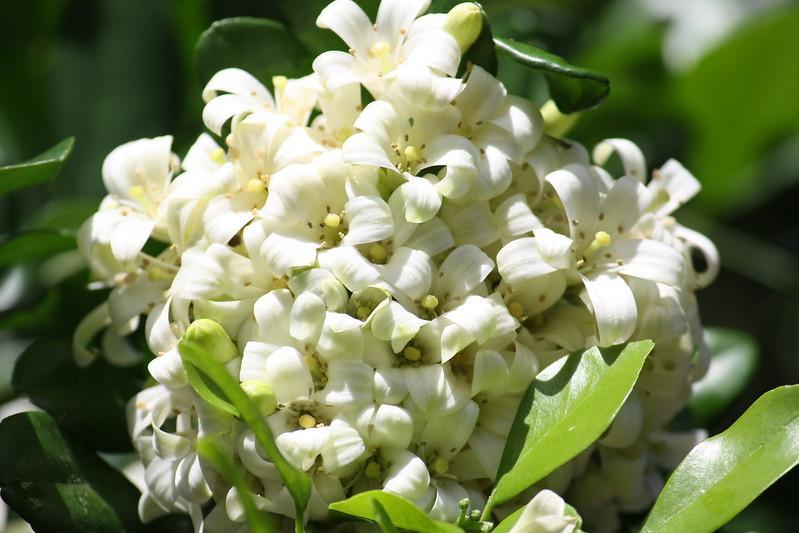
Mock Orange is a prized, late spring flowering bush with single or double-petaled, white flowers.
Overview
Mock orange shrubs have a quick growth rate and can gain a height of about 2 feet annually. It makes them ideal for creating flowery natural privacy screens around homes and backyards. Not only that, but mock orange shrubs also attract birds. So, if you want to add a bit of life to your otherwise quiet surroundings, you can’t go wrong with them.
Quick Facts & Care Guide
| Plant Type | Deciduous shrub |
| USDA Hardiness Zones | 4-8 |
| Origin | Europe and Asia |
| Mature Height | 1.8-3 m (6-10 ft) |
| Mature Spread | 1.8-3 m (6-10 ft) |
| Blooming Season | Late spring to early summer |
| Flower Characteristics | Fragrant, white, cup-shaped flowers that resemble orange blossoms |
| Foliage Characteristics | Deciduous, dark green leaves that turn yellow in fall |
| Sunlight Requirements | Full sun to part shade |
| Soil Requirements | Well-drained soil |
| Watering Requirements | Regular watering during the growing season |
| Fertilizer Requirements | Fertilize in spring with a balanced fertilizer |
Where To Buy?
Orange jasmine – Murraya paniculata – 10 fresh seeds – Etsy
17. Mountain Laurel (Kalmia latifolia)
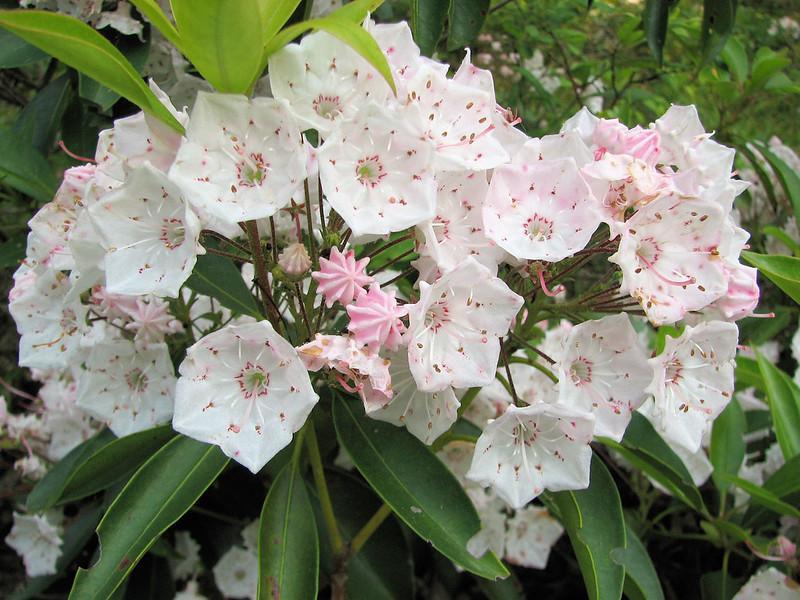
With spectacular displays of flowers, mountain laurels can take any landscape design to the next level.
Overview
Grown for its beautiful flowers and gorgeous, evergreen leaves, mountain laurel is a fantastic addition to foundation plantings and borders, and it glimpses incredible in group plantings. Aside from its colors, mountain laurel is most known for its reproductive methods. During the blooming season, the plant creates tension on its stamens (reproductive parts) and flings its pollen onto insects, bees, and other wildlife, such as hummingbirds.
Quick Facts & Care Guide
| Plant Type | Evergreen shrub |
| USDA Hardiness Zones | 4-9 |
| Origin | Eastern North America |
| Mature Height | 1.2-4.6 m (4-15 ft) |
| Mature Spread | 1.2-4.6 m (4-15 ft) |
| Blooming Season | Late spring to early summer |
| Flower Characteristics | Clusters of showy, pink-to-white flowers with unique shapes and intricate markings |
| Foliage Characteristics | Evergreen, glossy, dark green leaves that turn purplish-bronze in winter |
| Sunlight Requirements | Full sun to part shade |
| Soil Requirements | Acidic, well-drained soil |
| Watering Requirements | Regular watering during the growing season, drought-tolerant once established |
| Fertilizer Requirements | Fertilize in early spring with an acid-forming, slow-release fertilizer |
Where To Buy?
Mountain Laurel Kalmia latifolia 50 Seeds – Etsy
18. Magnolia (Magnolia spp.)

Large, scented, white flowers are just the beginning of the charm of a magnolia bush.
Overview
Magnolia shrubs are the iconic tree of the South, but they can be grown throughout the United States. These plants are known for producing stunning white and pink blooms that make your garden and backyard feel like a wedding movie stage set.
And did you know that Magnolias have been around for millions of years and are thought to be one of the first flowering plants on earth? So, go ahead and get yourself one right now.
Quick Facts & Care Guide
| Plant Type | Evergreen or deciduous shrubs or small tree |
| USDA Hardiness Zones | Varies depending on species, typically 4-9 |
| Origin | North America, Central America, Asia |
| Mature Height | Varies depending on species, typically 6-30 m (20-100 ft) |
| Mature Spread | Varies depending on species, typically 3-12 m (10-40 ft) |
| Blooming Season | Varies depending on species, typically in spring before the leaves emerge |
| Flower Characteristics | Large, showy, fragrant flowers in a variety of colors, including white, pink, purple, and yellow |
| Foliage Characteristics | Deciduous or evergreen, depending on species, with simple, glossy leaves |
| Sunlight Requirements | Full sun to part shade |
| Soil Requirements | Well-drained, acidic soil |
| Watering Requirements | Regular watering during the growing season, drought-tolerant once established |
| Fertilizer Requirements | Fertilize in spring with a slow-release, balanced fertilizer |
Where To Buy?
Magnolia Mix – White to Red – 5 Fresh Seeds – Magnolia – Etsy
19. Lilac (Syringa vulgaris)
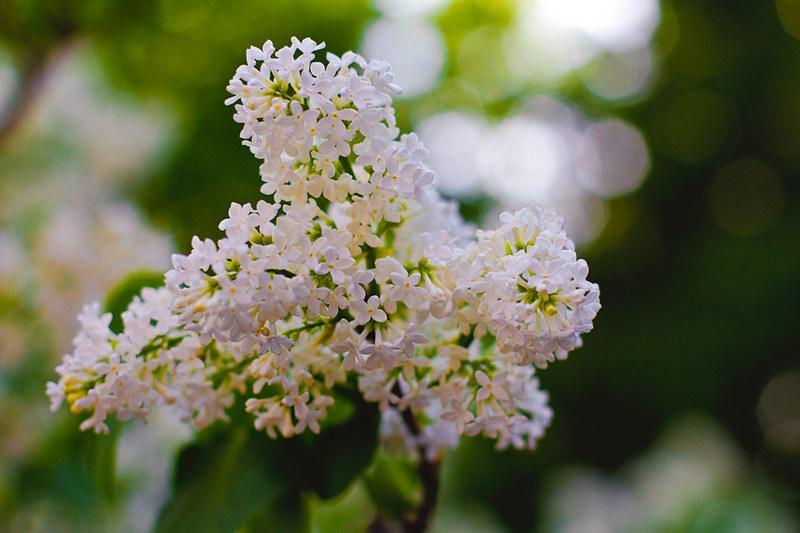
The lilac bush is generally planted for its fierce fragrance and attractive blooms.
Overview
Lilacs are classic garden shrubs with masses of scented, tubular flowers in shades of white, pink, and purple from late spring to early summer. Apart from their lovely blooms, lilacs are known for their reliability and toughness.
If taken care of properly, some plants can live up to 100 years, outliving the homeowners who planted them. Also, they are easy to grow, and their fragrant flowers attract pollinators and birds to the garden.
Quick Facts & Care Guide
| Plant Type | Deciduous shrub |
| USDA Hardiness Zones | 3-7 |
| Origin | Europe and Asia |
| Mature Height | 2.5-4.5 m (8-15 ft) |
| Mature Spread | 2.5-4.5 m (8-15 ft) |
| Blooming Season | Spring |
| Flower Characteristics | Clusters of fragrant, purple or white flowers |
| Foliage Characteristics | Deciduous, heart-shaped leaves |
| Sunlight Requirements | Full sun to part shade |
| Soil Requirements | Well-drained soil, slightly alkaline |
| Watering Requirements | Regular watering during the growing season |
| Fertilizer Requirements | Fertilize in early spring with a balanced fertilizer |
Where To Buy?
20 WHITE TREE LILAC Hummingbird Flower Seeds – Etsy
20. Laurel Cherry (Prunus laurocerasus)
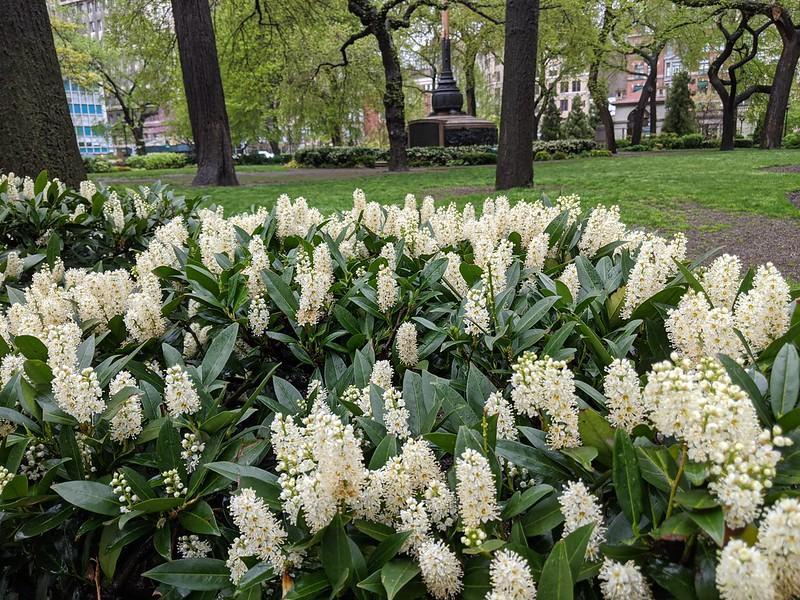
Laurel Cherry is known for its sickeningly fragrant flowers that bloom even in heavy shade.
Overview
With its shiny foliage, scented white flowers, and adaptability for many soil types, it’s no wonder that cherry laurel is one of the most popular selections for mass plantings, hedges, and foundation plants. What sets Laurel cherry apart from other plants is that it is as attractive in winter as in summer. Furthermore, these plants attract birds to their red, cherry-like fruits, and they are also a favorite of bees, butterflies, and other pollinators.
Quick Facts & Care Guide
| Plant Type | Evergreen shrub |
| USDA Hardiness Zones | 6-9 |
| Origin | Southeast Europe and Southwest Asia |
| Mature Height | 3-6 m (10-20 ft) |
| Mature Spread | 3-6 m (10-20 ft) |
| Blooming Season | Spring |
| Flower Characteristics | Small, white flowers arranged in long, upright racemes |
| Foliage Characteristics | Evergreen, glossy, dark green leaves |
| Sunlight Requirements | Full sun to part shade |
| Soil Requirements | Well-drained soil, slightly acidic to slightly alkaline |
| Watering Requirements | Regular watering during the growing season |
| Fertilizer Requirements | Fertilize in early spring with a balanced fertilizer |
Where To Buy?
Cherry Laurel Seeds Organic Seeds – Etsy
21. Japanese Pieris (Pieris japonica)
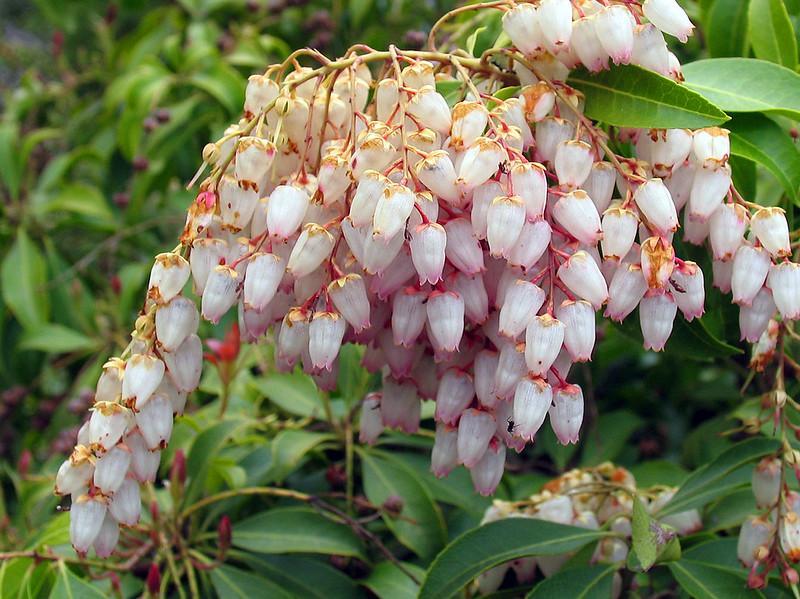
Also known as the lily of the valley bushes, the Japanese Pieris is a broadleaf shrub.
Overview
Japanese Pieris has many names, including lily-of-the-valley shrub and Japanese andromeda. However, no matter what you call it, you will never be bored with this beautiful shrub. Its leaves change color, and clusters of colorful flower buds appear on the plant in late summer and fall. These buds then open into melodramatic, white blossoms in spring. However, be careful. If you, your children, or your pets eat its flowers, it can cause seizures.
Quick Facts & Care Guide
| Plant Type | Evergreen shrub |
| USDA Hardiness Zones | 5-8 |
| Origin | Eastern Asia |
| Mature Height | 1.5-3 m (5-10 ft) |
| Mature Spread | 1-2 m (3-6 ft) |
| Blooming Season | Late winter to early spring |
| Flower Characteristics | Drooping clusters of small, bell-shaped flowers |
| Foliage Characteristics | Evergreen, leathery leaves with new red growth. |
| Sunlight Requirements | Part shade to full shade |
| Soil Requirements | Moist, well-drained, acidic soil |
| Watering Requirements | Regular watering during the growing season |
| Fertilizer Requirements | Fertilize in early spring with an acidic fertilizer |
22. Japanese Camellia (Camellia japonica)
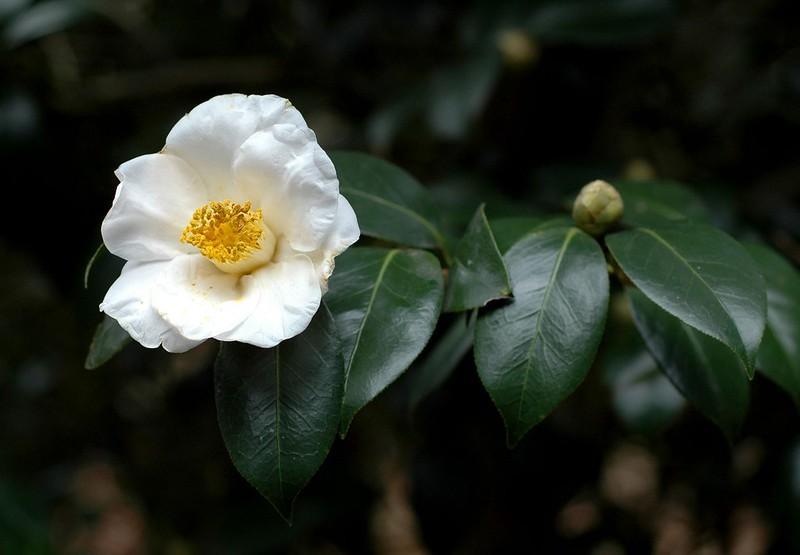
Japanese Camellia is a widely grown formal garden shrub often used for landscaping.
Overview
Camellias are popular gardening and hedging plants with showy blooms, and the Japanese camellia is one of my favorites. These plants display stunning single or double flowers in the winter, featuring glossy, dark green foliage year-round. In China, it is considered a symbol of good luck; even if you do not believe that, you should still welcome it to your collection. Their flowers come early in the season when not much else is flowering.
Quick Facts & Care Guide
| Plant Type | Evergreen shrub |
| USDA Hardiness Zones | 7-9 |
| Origin | Japan, Korea, China |
| Mature Height | 1-6 m (3-20 ft) |
| Mature Spread | 1-4 m (3-13 ft) |
| Blooming Season | Winter to early spring |
| Flower Characteristics | Large, showy, single or double flowers |
| Foliage Characteristics | Glossy, evergreen leaves |
| Sunlight Requirements | Part shade to full shade |
| Soil Requirements | Well-draining, acidic soil |
| Watering Requirements | Regular watering during the growing season |
| Fertilizer Requirements | Fertilize in late winter or early spring with a balanced fertilizer |
Where to Buy?
5 White Camellia Flower Seeds Fragrant Flower – Etsy
23. Hydrangea (Hydrangea spp.)
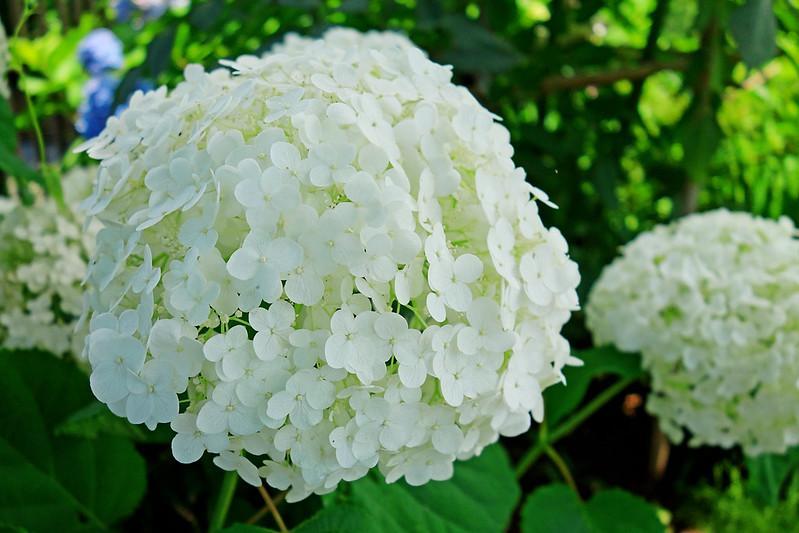
Hydrangeas are much-loved deciduous hardy bushes, some of which are good climbers.
Overview
If you’re looking for a flower with show appeal, you cannot go wrong with hydrangea flowers. These beautiful, lush blooms are classic, whether flourishing in a planter or a vase or blooming in the backyard. Also, they grow fast. Averaging about 2 feet of growth annually, larger cultivars of hydrangeas can reach up to 12 to 15 feet tall. However, when planting, please ensure you get a suitable species according to your region and climate.
Quick Facts & Care Guide
| Plant Type | Deciduous shrub |
| USDA Hardiness Zones | Varies by species and cultivar, typically 3-9 |
| Origin | Asia, North, and South America, Europe |
| Mature Height | Varies by species and cultivar |
| Mature Spread | Varies by species and cultivar |
| Blooming Season | Summer to fall |
| Flower Characteristics | Large, showy blooms in shades of pink, blue, white, or purple |
| Foliage Characteristics | Opposite, serrated leaves |
| Sunlight Requirements | Part shade to full sun depending on species and cultivar |
| Soil Requirements | Moist, well-draining soil with organic matter |
| Watering Requirements | Regular watering during the growing season |
| Fertilizer Requirements | Fertilize in early spring with a balanced fertilizer |
Where To Buy?
20Pcs Perennial Seeds Home Garden White Hydrangea Seeds
24. Elderberry (Sambucus canadensis)
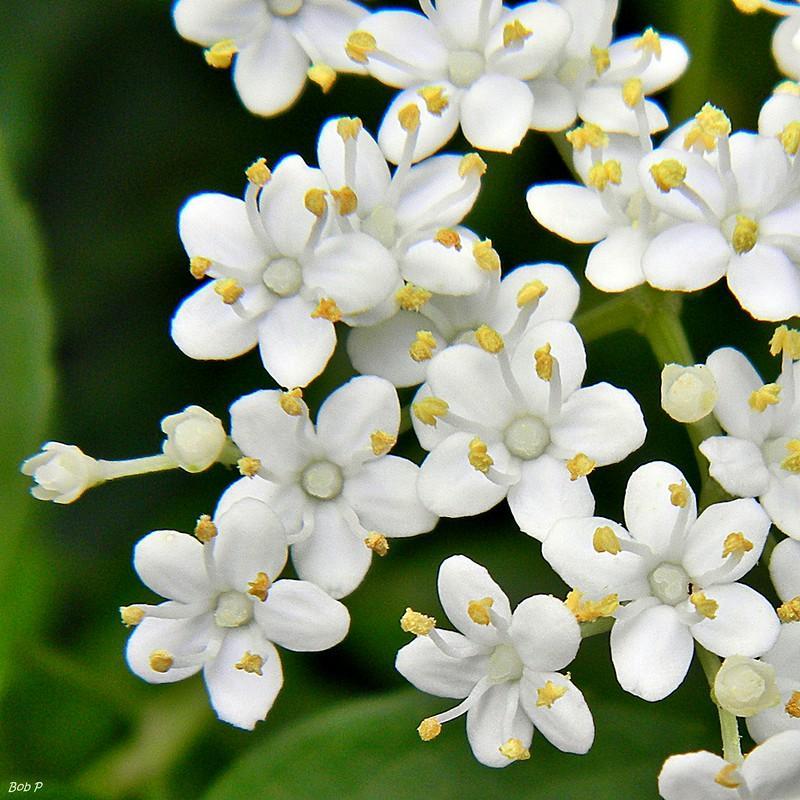
Elderberry bush produces bluish-black fruit often used in wines, juices, jellies, and jams.
Overview
The elderberry tree, despite its name, is more of a shrub. They provide food and shelter for many species of pollinating insects and songbirds. The Elderberry trees also produce flowers! They are ivory white and look stunning across their flashy green leaves. However, if you decide to seed elderberry shrubs in your home, please remember that you may have to wait 2 to 3 years before they bear fragrant white flowers.
Quick Facts & Care Guide
| Plant Type | Deciduous shrub |
| USDA Hardiness Zones | 3-8 |
| Origin | North America |
| Mature Height | 3-12 feet |
| Mature Spread | 3-12 feet |
| Blooming Season | Late spring to early summer |
| Flower Characteristics | Clusters of small, fragrant white flowers |
| Foliage Characteristics | Compound leaves with 5-9 leaflets |
| Sunlight Requirements | Full sun to part shade |
| Soil Requirements | Well-drained soil with plenty of organic matter |
| Watering Requirements | Regular watering during the growing season |
| Fertilizer Requirements | Fertilize in early spring with a balanced fertilizer |
Where To Buy?
American Elderberry Cuttings | 6+ Elderberry CUTTINGS | Etsy
RELATED: As Fresh As A Rose: 20 Different Types Of Rose Of Sharon Flowers
25. Deutzia (Deutzia spp.)
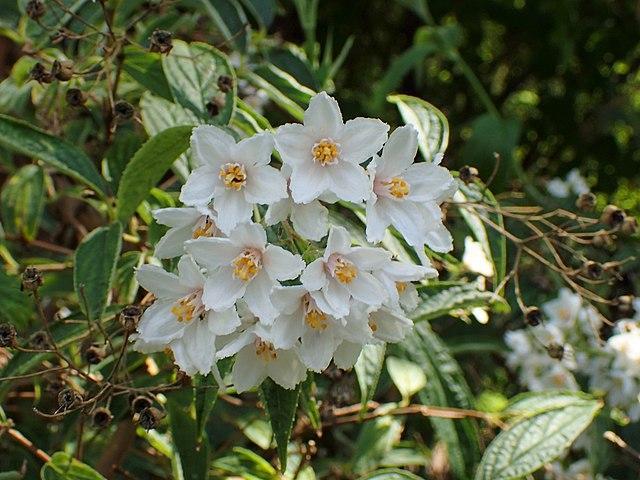
Deutzia’s gorgeous white blooms make them just as popular with humans as with wildlife.
Overview
If you live in an area with large buildings or trees and are looking for a shrub that can bloom white even in dense shade, Deutzia is the perfect shrub for your needs. With over 60 species, Deutzia has a fair amount of diversity, and you will not have any issues finding something you need. Also, it is versatile. You can use it in mass plantings, containers, or borders, as well as ground cover, hedging, and privacy screening.
Quick Facts & Care Guide
| Plant Type | Varies by species, but evergreen or deciduous shrubs |
| USDA Hardiness Zones | 5-8 |
| Origin | Asia |
| Mature Height | 2-10 feet |
| Mature Spread | 2-10 feet |
| Blooming Season | Late spring to early summer |
| Flower Characteristics | Profuse clusters of pink or white flowers |
| Foliage Characteristics | Opposite, simple leaves |
| Sunlight Requirements | Full sun to part shade |
| Soil Requirements | Well-drained, fertile soil with plenty of organic matter |
| Watering Requirements | Regular watering during the growing season |
| Fertilizer Requirements | Fertilize in early spring with a balanced fertilizer |
Where To Buy?
Deutzia gracilis ‘Nikko’ DEUTZIA
26. Daphne (Daphne spp.)

Daphnes are attractive shrubs and bushes, producing white to pink tubular flowers.
Overview
These beautiful shrubs with sweetly scented blooms are high on many gardeners’ lists of “must-haves.” They are compact and flower freely, adding pink and white colors to the garden during the winter when only a few plants dare to bloom. Furthermore, there are many species of Daphne plants for sun or shade, so you will have choices to suit your specific needs. However, do remember that Daphnes are a bit fussy about growing conditions.
Quick Facts & Care Guide
| Plant Type | Evergreen or deciduous shrub |
| USDA Hardiness Zones | 4-9 |
| Origin | Asia, Europe, and North Africa |
| Mature Height | 1-6 feet |
| Mature Spread | 1-6 feet |
| Blooming Season | Late winter to early spring |
| Flower Characteristics | Fragrant, small flowers in clusters or clusters at the end of stems |
| Foliage Characteristics | Glossy, dark green leaves |
| Sunlight Requirements | Full sun to part shade |
| Soil Requirements | Well-drained soil with plenty of organic matter |
| Watering Requirements | Regular watering during the growing season |
| Fertilizer Requirements | Fertilize in early spring with a balanced fertilizer |
Where To Buy?
Pink Perfume Princess Winter Daphne – 2 Gallon Pot
27. Crape Myrtle ‘Natchez’ (Lagerstroemia x Natchez)
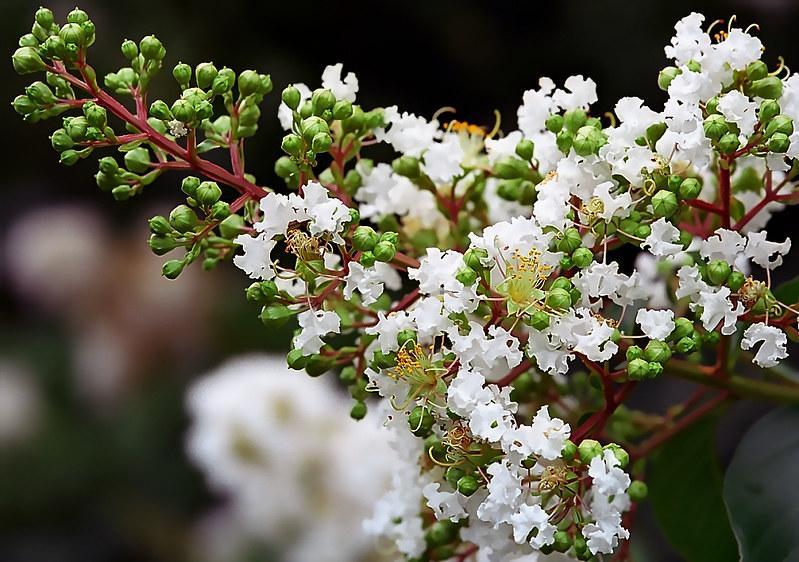
If you want a shrub that flowers later in the season, the “Natchez” crepe myrtle is for you.
Overview
Do you want a shrubby tree that flowers for about five months a year and provides shade too? Then look no further; I present you Crape Myrtle’ Natchez.’ Only a few white flowering shrubs are as prolific as Crape Myrtle’ Natchez.’ These plants make fantastic focal points and eye-catching specimens in any gardening landscape. Some larger varieties can also be used as natural privacy screens and hedges around homes and lawns.
Quick Facts & Care Guide
| Plant Type | Deciduous shrubs or tree |
| USDA Hardiness Zones | 7-9 |
| Origin | Hybrid cultivar developed in the United States |
| Mature Height | 20-30 feet |
| Mature Spread | 15-25 feet |
| Blooming Season | Summer |
| Flower Characteristics | Large, showy, white flowers in clusters |
| Foliage Characteristics | Dark green leaves that turn to red-orange in autumn |
| Sunlight Requirements | Full sun |
| Soil Requirements | Well-drained soil |
| Watering Requirements | Regular watering during the growing season |
| Fertilizer Requirements | Fertilize in early spring with a balanced fertilizer |
Where To Buy?
6 Pack – Natchez (White) Crape Myrtle Trees – Amazon
28. Common Myrtle (Myrtus communis)
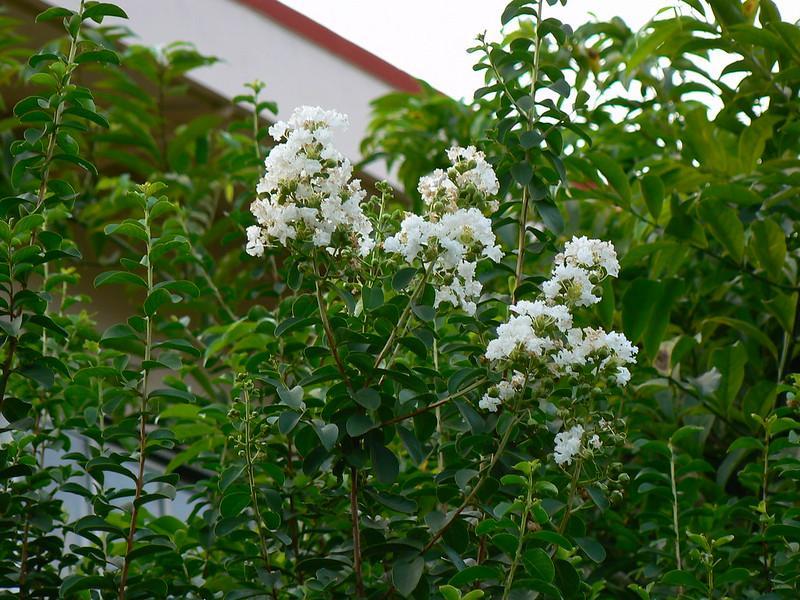
Common Myrtles make lovely indoor and outdoor plants and have done for many years.
Overview
Common myrtle is often cultivated in gardens because of its easy care-taking requirements, speedy growth, and attractive looks. They are native to warmer parts of the world, so they do not do well in the colder climate of the US. However, they make great indoor plants due to their aromatic white blossom. The Royal Horticultural Society has also given it its prestigious Award of Garden Merit. So, what are you waiting for? Go ahead and get it.
Quick Facts & Care Guide
| Plant Type | Evergreen shrubs or small tree |
| USDA Hardiness Zones | 8-11 |
| Origin | Mediterranean region |
| Mature Height | 3-10 feet |
| Mature Spread | 3-6 feet |
| Blooming Season | Summer |
| Flower Characteristics | Fragrant, white, or pink flowers |
| Foliage Characteristics | Small, glossy, dark green leaves |
| Sunlight Requirements | Full sun to part shade |
| Soil Requirements | Well-drained soil |
| Watering Requirements | Regular watering during the growing season |
| Fertilizer Requirements | Fertilize in early spring with a balanced fertilizer |
Where To Buy?
Myrtus communis 30 fresh seeds common myrtle – Etsy
29. Chokeberry (Aronia arbutifolia)
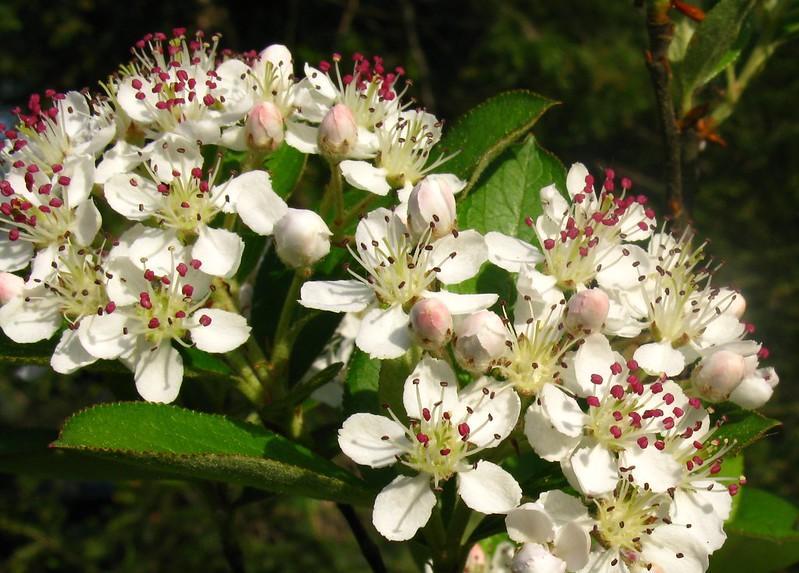
Chokeberyy is multi-stemmed, and plants can form large, dense colonies over time.
Overview
With nutritious edible fruit, tolerance to a wide range of growing conditions, and three-season interest, chokeberry makes an invaluable addition to any landscape. And in recent years, chokeberry has gained renewed attention for its health benefit. Aside from that, due to its dense growth and tolerance to wet conditions, chokeberry is often used in mass plantings as windbreaks and in excessively moist soils for erosion control.
Quick Facts & Care Guide
| Plant Type | |
| USDA Hardiness Zones | 4-9 |
| Origin | Eastern North America |
| Mature Height | 6-10 feet |
| Mature Spread | 3-5 feet |
| Blooming Season | Spring |
| Flower Characteristics | Clusters of white to pinkish flowers |
| Foliage Characteristics | Glossy green leaves turning red in fall |
| Sunlight Requirements | Full sun to part shade |
| Soil Requirements | Moist, well-drained soil |
| Watering Requirements | Regular watering during the growing season |
| Fertilizer Requirements | Fertilize in early spring with a balanced fertilizer |
Where To Buy?
Chokecherry Seeds – Wild Edible – Zone 3 – Etsy
30. Button Bush (Cephalanthus occidentalis)
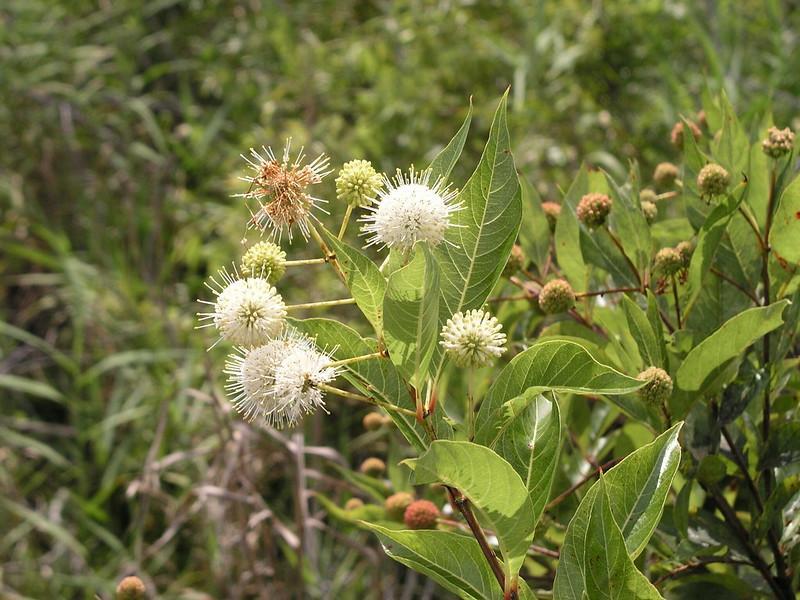
Unlike most white flowering shrubs, buttonbush is lauded for its utility rather than beauty.
Overview
Buttonbush is a fast grower often used to control soil erosion near rivers and wetlands. It loves growing in swamps, riverbanks, rain ponds, garden ponds, and just about any consistently wet site. Aside from its utility, buttonbush also has ornamental value. It produces spherical blossoms composed of dense clusters of tiny white tubular flowers. And these flowers attract butterflies and provide food and nesting sites for birds.
Quick Facts & Care Guide
| Plant Type | Deciduous shrub |
| USDA Hardiness Zones | 5-10 |
| Origin | The Eastern United States |
| Mature Height | 1.5 to 3 m (5 to 10 ft) |
| Mature Spread | 1.5 to 3 m (5 to 10 ft) |
| Blooming Season | Summer |
| Flower Characteristics | Small, spherical, white or pinkish flowers in clusters |
| Foliage Characteristics | Dark green, glossy, elliptical leaves turning yellow in fall |
| Sunlight Requirements | Full sun to partial shade |
| Soil Requirements | Moist to wet, well-drained soil |
| Watering Requirements | Regular watering |
| Fertilizer Requirements | Fertilize in early spring with a balanced fertilizer |
Where To Buy?
Button Bush seeds 20 count – Etsy
Final Thoughts
So, there you have it. A comprehensive list of some of the most unique and beautiful white flowering shrubs. They bring brightness to the landscape and attract all kinds of wildlife. However, you do not just want to plant white bushes only around your home. Unless you are designing a moon garden, an all-white garden can be glaring to look at. So, you might want to mix your white flowering shrubs with some green and other plant colors.
What are your favorite white flowering shrubs? Comment below. Also, check out our other articles:
What Is Eating My Rose Leaves? Common Causes And Quick Solutions!




